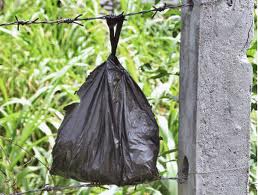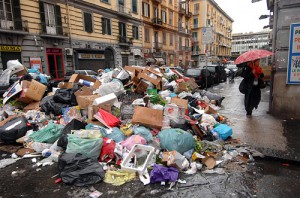Sunday
Community ArticlesTalking Trash
 Commemorating Earth Day
Commemorating Earth Day
by Anenome Fresh
resident gardener at Karme Choling
One afternoon in mid-January, I decided to start taking accountability for the trash I produce. I was tired of mindlessly taking a paper napkin with every meal, most usually not using it or needing it. I used a lot of products without even thinking or connecting with the ecological costs, and my behavior was causing me pain. Living in a community in which we practice mindfulness, I had had enough. I figured that if the body of the earth could withstand the enormous amount of trash we dump into it, my body could hold onto my own trash and experience how it felt. I tied a plastic bag around my belt, and for the next 30 days: my trash became my companion.
Editor’s Note: We are currently on hiatus from publishing new articles; in the meantime, please enjoy this classic item reprinted from our back issues.
Having my trash tied to my hip was a constant reminder of my habits that produce waste. I discovered through the course of the month that most of those habits are not necessary, helpful, or even more convenient. I realize now that I can make empowering choices that limit the amount of non-biodegradable waste I produce. This makes our environmental crisis very personal, and also shows me that my actions have a very real impact.
So much of my trash production was a result of laziness – not having a recycling container nearby, or conning myself into believing that a small little piece of paper didn’t need to be recycled. Several times in the past, I can recall whilst driving throwing out organic waste because I didn’t want to deal with a banana peel for the next 100 miles. I experienced through this trash project that holding onto all of my recyclable and compostable material until I found the proper place for them actually felt good, wholesome, and even dignified. I felt like a responsible, empowered citizen.
This project also led me to contemplate my connection with all of the various products I consume. How much oil was being burned to bring that slice of pineapple to my plate? How much energy was consumed to manufacture that recyclable plastic container, fill it with milk, ship it my way, and keep it cold until I decided to drink it? I discovered that I really enjoy knowing where my products come from, knowing who I support with my purchase; somehow it feels so much more human than typing my credit card into a computer and having my order appear on my doorstep a week later. The product I receive feels much richer and more valuable as well when I know how it got to me.
Another discovery for me during these 30 days was that trash itself isn’t inherently disgusting or dirty. Although I would sit there at the breakfast table and stare at my trash, wishing I could get rid of it – it wasn’t pretty, it was growing larger and it was a constant reminder of my landfill contribution – what I had in my bag did not smell bad and was not really revolting. What about trash do we normally regard as unsanitary? Rotting food or anything we throw away without properly washing or caring for, perhaps – at least that’s what always made my trash feel dirty. I realize now that we do not need to fill our trash cans with such stuff, and in fact, if we take accountability for our trash, we start taking accountability for our lives, for what we use and can reuse, for what we eat and how we eat it, how we regard leftovers, and the choices we make when purchasing products.
In the end after 30 days, I had 39 ounces of trash (2 lbs, 7 oz) which consisted mostly of plastics – gum and food wrappers, a hemp milk non-recyclable container, packing peanuts, an empty tube of toothpaste, dental floss, and a ceramic mug that broke into tiny pieces…
My habitual patterns shifted after about ten days. Some of the ways in which my behavior changed are so simple, including carrying around a hankerchief rather than using tissues and really contemplating products before I make the choice to purchase (I have stopped drinking boxed hemp milk and now go get milk from a local farmer – a luxury of living here in rural Vermont). I feel as though my changes in behavior have not only altered the health of the planet, but simultaneously have improved my own mental and physical health. This simple project which arose as a response to my painful habitual patterns has had a profound impact on me.
 Throughout this month, a memory kept flashing back at me of a lesson about waste I learned during my first couple weeks living in Turkmenistan, Central Asia. I was taking daily Turkmen Language classes with my ever-cheerful and patient language tutor, Myrat, and had a personal concern about what was going to happen to my host family’s outhouse when it filled up (it was nearing the brim). I attempted to ask, “Where does the waste go after the outhouse fills?” After nearly an hour of laughs and a series of attempts to convey my concern, a look of understanding appeared on his face and he exclaimed, “Ah! I see! It gets taken to a REALLY BIG outhouse.” At the time, I remember being appalled, knowing that the really big outhouse was really some roadside spot not too far from the river which irrigated our fields and provided us with bathing and drinking water. Most recently, I have been reflecting on the simple truth of that statement for all of us, as a global community. How many of us know where our trash goes after it gets hauled away? Or where the toilet water gets flushed? We live in such a throw-away world that many of us never ponder these questions. If we sit with these questions, we probably realize that it’s somewhat of a mystery where it all goes.
Throughout this month, a memory kept flashing back at me of a lesson about waste I learned during my first couple weeks living in Turkmenistan, Central Asia. I was taking daily Turkmen Language classes with my ever-cheerful and patient language tutor, Myrat, and had a personal concern about what was going to happen to my host family’s outhouse when it filled up (it was nearing the brim). I attempted to ask, “Where does the waste go after the outhouse fills?” After nearly an hour of laughs and a series of attempts to convey my concern, a look of understanding appeared on his face and he exclaimed, “Ah! I see! It gets taken to a REALLY BIG outhouse.” At the time, I remember being appalled, knowing that the really big outhouse was really some roadside spot not too far from the river which irrigated our fields and provided us with bathing and drinking water. Most recently, I have been reflecting on the simple truth of that statement for all of us, as a global community. How many of us know where our trash goes after it gets hauled away? Or where the toilet water gets flushed? We live in such a throw-away world that many of us never ponder these questions. If we sit with these questions, we probably realize that it’s somewhat of a mystery where it all goes.
Although inquiring about landfills and contemplating the ecological state of the earth can feel very overwhelming and cause us to slip into a state of ambivalence, there are solutions available and ways to connect on a personal level that make our lives more wholesome and empowered. This project leaves me inspired to continue carrying around my trash, and learning to connect in a deeper way to the environment around me and hopefully inspiring others to do the same. How little trash can you produce in 30 days?

















May 4, 2012
Reply
Anenome, I love you. I’m gonna spam this to everyone I care about.
And you, you should work for NASA! or the National Parks Service. Or even a Land Center.
I am now involved in a similar project. I send a portion of all my waste-stream into a giant experiment which LA County conducts. It is called “LA-County LAnd-Fill”. There’s been some mess related to the scale (ongoing for almost 100 years), but this effort makes a heap of cash, equivalent in size!
Most of the dividends go to support 5th-generation working-class Italian families back East, and a few local contractors like Cargill…
Personally I am looking to a payday of uncovering amazing new sciences and life-forms inside the “landfill” when the nano-bots begin the recycling portion of the project. I am hoping to leverage more interest in the intellectual rights..
Just goes to show- Garbage is Good News “if you want it”!
-Leo
May 3, 2012
Reply
Very inspiring Anenome, thank you!
May 3, 2012
Reply
Anemone, I am so inspired by your article. I have reduced my trash production considerably over the years, but what still gets to me are the endless plastic bags that products are packaged in. I have been thinking of writing to various manufacturers to suggest that they put recycling symbols on the bags, because, here in Portland, at least, we can recycle 1-7 plastics. When I can, I do choose items that are not packaged, but it’s not always possible.
Thank you for sharing your journey of carrying a month’s worth of trash. We all need these reminders as we are bombarded by convenience products and choices, choices, choices.
I am glad that you are bringing this awareness to our community.
May 3, 2012
Reply
Well done Anemone. A very thoughtful piece from an amazing woman. May your gardens flourish with beauty and magic.
May 3, 2012
Reply
Try composting with worms, its a wonderful way to dispose of your green waste and they love it, you can then put it on your garden to grow your food. you can do it wherever you live, we have a tiny garden in the city, a worm composting bin and a garden full of home grown veggies :)
Apr 27, 2012
Reply
What an insightful article. Thanks for sharing your experience with us all. I’ve been looking for indoor compost machines. I came close to getting one several years ago and now don’t see one that looks really workable. That would truly reduce a lot of peelings, rinds, grounds, etc from the kitchen. I’m inspired by your story to press on and address this issue this year.
Apr 26, 2012
Reply
Thank you, Anemone. Bravo!